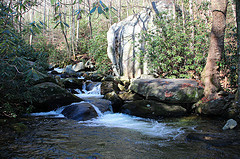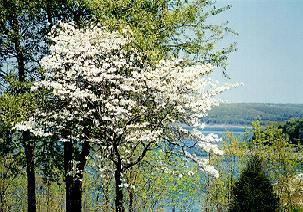What do you think?
Rate this book


192 pages, ebook
First published March 15, 2016

TAKING DOWN THE LINES
They tore the telephone lines
from the valley like unhealed
stitches, poles and wires hauled off
through which voices had once flowed
across Jocassee like freshets
crisscrossing, running backward
into far coves where one phone
might be shared by five families.
In those lines was sediment
of births and sickness, deaths,
love vows and threats, all passed on
mouth to mouth, vital as breath
before silenced in the lake's
currents of lost connections.
LISTENING TO WBT
All you had to do was turn the knob
until the light clicked on and soon you'd find
rising out of static was your life.
Every time you heard "The Weave Room Blues"
or "Cotton Mill Colic No. 3" you felt
like a deer that risked a meadow, its eyes
lifted to see the barrel too late.
Someone had caught you in his sights,
hit you solid in the guts
with all the things that you had thought
you didn't want to think too long about.
But days later you'd catch yourself
humming those lines as you worked your shift.
Maybe it was the banjo and guitar,
the way they prettied up the words,
that made those songs lift up your heart
same as a Sunday morning hymn.
Or maybe in the end it was the words,
the bare-assed truth making a stand
in a voice that could have been your own.
ABANDONED HOMESTEAD IN WATAUGA COUNTY
All that once was is this,
shattered glass, a rot
of tin and wood, the hum
of limp-legged wasps that ascend
like mote swirls in the heatlight.
Out front a cherry tree
buckles in fruit, harvested
by yellow jackets and starlings,
the wind, the rain, and the sun.
BEARINGS
He's scraped manure off his boots a last time,
filled the front room with what he has chosen
to keep on owning. He's alone, his uncle gone,
gearing back through the hills upwinding into
the gasping curves and drops of the mountains.
He stands on the porch, no work until tomorrow,
millhouses planted like corn rows each way he
looks, Eureka's water tower rising above as if
a hard high-legged scarecrow. He steps down on
the strange level road, walks west toward town.
He finds a grill, asks for what he's memorized:
a hamburger and a Coke and his change. Outside
in the loud afternoon, he stares into windows
until he sees shoes. The clerk takes his bills
and grins when my grandfather asks for a poke.
He walks out toward Eureka's smoke and rumble,
toward the millhouses crouched and huddled in
the mill's shadow, and soon finds he is lost.
Each house might be his or maybe the next one,
and he walks an hour before he finally asks.
He tells the man he is looking for James Rash,
a friend who's just moved here. The man says
Tommy Singleton got fired last week. I'd bet
that's where your friend is at and points to
a house, and so my grandfather found himself.
He stayed inside till the whistle woke him up,
and threw his boots on the roof so they might
guide him back those first evenings and later
the Saturday nights he weaved under moonshine,
searching roof after roof trying to find home.
WOLF LAUREL
Tree branches ice-shackled, ground
hard as an anvil, three sons
and a father leave the blaze
huddled around all morning,
wade snow two miles where they cross
Wolf Laurel Creek, poke rifles
in rock holes, cliff leans hoping
to quarry what's killed five sheep,
but no den found as the ridge
sips away the gray last light
of winter solstice, and they
head back toward home, the trail
falling in blur-dark and then
the father falls too, eyes locked,
wrist unpulsed, the sons without
lantern, enough lingering light,
know they must leave him or risk
all of them lost, know what waits
for death in this place, so break
a hole in Wolf Laurel's ice,
come back at first light to find
the creek's scab of cold covered
with snow-drift, circling paw prints
brushed away that sons might see
a father's face staring through
the ice as through a mirror.
POCKETKNIVES
Carried like time, consulted
as often when the sermon
droned on past noon, hay bailer
broke a chain, any other
lingering moments their scarred
and calloused workflesh idled,
the blades pried free the way wives
might slip a ribbon, that same
delicate tug when forge-craft
sharpened what light sun or bulb
provided as they trimmed dirt
from the undersides of nails,
surfaced splinters, bled blisters,
a tool but more than a tool
each time they rasped a whetstone
across steel until it flashed
pure as silver, then a rag
doused in oil to rub new-bright
the handles hewed from antler,
pearl, hardwood and ivory
laced with brass or gold, the one
vanity of men caught once
when dead in a coat and tie,
so ordered from catalogs,
saved and traded for, searched for
in sheds and fields if lost, passed
father to son as heirlooms,
like talismans carried close
though most times, cloaked as the hearts
of these men who rarely spoke
their fears and hopes, let their words
clench inside a locked silence.
THE WATCH
Almost like a scythe, the sweep
of mesh through creek-pool, that slow
harvest of dace and crayfish,
the homemade seine held between
my brother and me, worked deep
in each undercut, sinkers
scraping white sand like a rake,
and this morning a subtle
bowing, then give, bringing up
a gold watch three decades dropped
from our grandfather's pocket,
lost in his field, freshet-swept
to this pool some longback spring.
My knife blade pries open time
like a clam, water spilling
out lost hours, and though I try
with shake and stem wind to rouse,
the hands do not move, remain
at six-thirty, one placed on
the other like dead man's hands.
THE CORPSE BIRD
Bed-sick she heard the bird's call
fall soft as a pall that night
quilts tightened around her throat,
her gray eyes narrowed, their light
gone as she saw what she'd heard
waiting for her in the tree
cut down at daybreak by kin
to make the coffin, bury
that wood around her so death
might find one less place to perch.
THE FOX
Two months before he died my uncle saw
a red fox near the field edge where he plowed,
watching him, its tongue unpanting though
the August heat-haze waved the air like water.
That night he claimed it was his father, then laughed
as if he wasn't serious, as if
all summer long we hadn't watched his face
grow old too quick, gray-stubbled, sudden-lined.
His wife would try the last days that he lived
to get him to the hospital but he
took to his bed, awaited the approach
of padded feet, coming close, then closer.
PHOTOGRAPH OF MY PARENTS OUTSIDE EUREKA COTTON MILL. DATED JUNE 1950
Back against the chain-link fence,
my father's muscled left arm twists
like vine that sprouts a wire-meshed fist.
My mother leans into his chest.
She's known him a month, cannot guess
what I will see, at least not yet,
in my father's odd pose, the fingerless
awkward clutch of metal, as if
caught in Eureka's sprung-steel grip.
WATAUGA COUNTY: 1962
Smell of honeysuckle bright
as dew beads stringing lines on
the writing spider's silk page,
night's cool lingering, the sun
awake but still lying down,
its slant-light seeping through gaps
of oak branches as the first
blackberry pings the milk pail's
emptiness, begins the slow
filling up, the plush feel of
berries only yesterday
red-green knots before steeped in
dark to a deep purple hue,
and as dawn passes, the pail
grows heavy, wearies my arm
until I sit down inside
that maze of briar I make
my kingdom, lift to my mouth
the sweet wine of blackberry,
my hands stained like royalty.
 come to my blog!
come to my blog!
The lost can stay lost down here,
in laurel slicks, false-pathed caves.
Too much too soon disappears here.
On creek banks clearings appear,
once homesteads. Nothing remains.
The lost can stay lost down here,
like Tom Clark's child, our worst fears
confirmed as we searched in vain.
Too much too soon disappears.
How often this is made clear
where cliff-shadows pall our days.
The lost can stay lost down here,
lives slip away like water.
We fill our Bibles with names.
The lost can stay lost down here.
Too much too soon disappears.

Here a bride planted hundreds
of dogwoods, so coming springs
branches flared with white blossoms,
waking an orchard of light
against that bleak narrative
of place name, a life scratched out
on ground as much rock as dirt.
Decades passed as she raised what
might look from distant summit
like a white flag unfurled, though
anything but surrender.